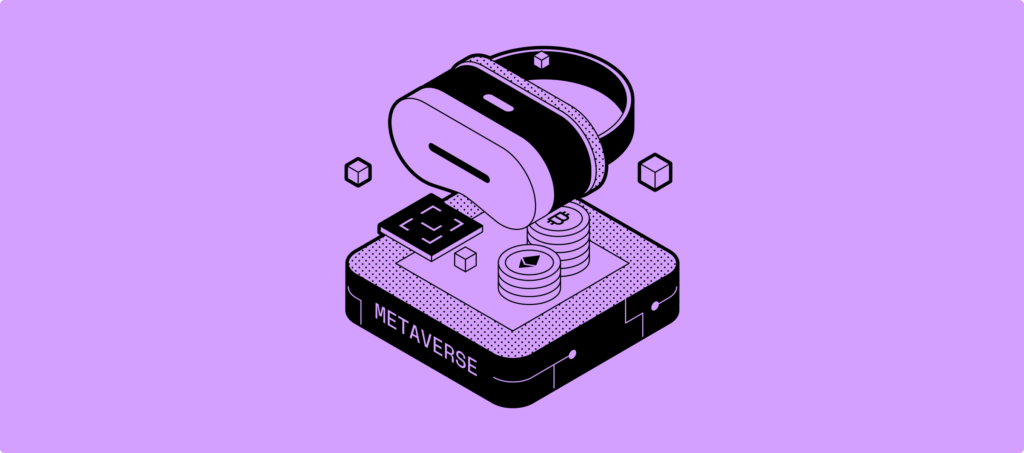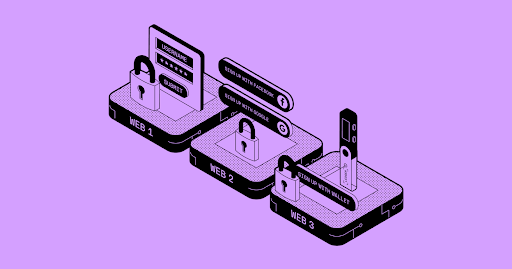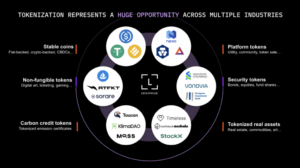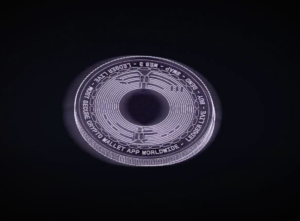
By Sebastien Badault, VP Metaverse at Ledger.
The Metaverse is one of the most hyped concepts of the past 12 months.
For many, it will become the next computing platform replacing smartphones and laptops, creating new ways to engage socially and professionally.
As the world’s leading secure gateway to Web3, Ledger closely monitors this next tech frontier poised to usher in an ever expanding ecosystem of tokens, NFTs and digital avatars.
But what is the Metaverse exactly?
Back To The Genesis
Arthur C. Clarke, a science fiction writer, once said that “any sufficiently advanced technology is indistinguishable from magic.” Today, it’s also becoming increasingly indistinguishable from reality. Of all the paradigm shifts, the merging of physical and digital reality into one experience vector is profound.
Our general understanding of the Metaverse is however mistakenly influenced by science-fiction.
The term “Metaverse” was first coined by Neal Stephenson in his 1991 novel Snow Crash. It described a Virtual World, successor to the Internet that could be explored through Avatars to escape a Dystopian World.
20 years later Ernest Cline’s depiction of a very similar world in Ready Player One was a huge hit that warranted a cinematic adaptation from Steven Spielgerg. In this book, the heroes are trying to save their Virtual World because the “Real” World is beyond saving.
Nowadays, when people try to understand the Metaverse, they erroneously cite Ready Player One. But this movie is NOT synonymous with the concept. It only depicts the Metaverse as an immersive world, which, as I will detail further below, is an incomplete conception.
Even though the Ready Player One heroes are able to jump from one world to another, they always remain within a centralized “Oasis”, while the Metaverse in which I believe is decentralized and governed by its users.
Are we already in the Metaverse?
If we are to oppose the Metaverse with the “Real” World, then we are already living a very high portion of our lives in an early version of the Metaverse.
Our grandparents lived 100% of their time in the “Real” World, but the launch of TV in the 50’s brought that number down to 80%, the advent of cable down to 70%, laptops and smartphones under 50%. The outbreak of the pandemic also greatly contributed to the digitization of our social interactions.
Was Covid a giant dress rehearsal for the Metaverse? Paradoxically, not that much. Some incomplete versions of the Metaverse existed before.
In the early 2000’s, Philip Rosedal, a brilliant technologist, built a virtual environment called Second Life. The game was accessible by creating an avatar. You could buy land, build a house or a place to hang out with your friends, a digital currency even enabled transactions between users.
With over 60 million accounts created and a million active users, the simulation was a huge success. What is astonishing is that 20 years after its creation, it is still successful. The number of active users is higher than it was back then and the Second Life Economy is $650 million a year of goods traded.

In 2017, the launch of Fortnite by Epic Games with massively improved graphics and gameplay took the Metaverse concept to the next level. It currently has 350 million users.
Beyond the adoption, there are two very differentiating factors in Fortnite.
The first one is that the game is free and accessible from any platform. You can play on a Playstation, an Xbox, a Nintendo Switch, a PC or a CellPhone. Your overall experience is the same, the game records your progress and digital goods.
This is revolutionary.
The second is how the game has democratized these digital goods. The current NFT craze likely wouldn’t have happened without this game paving the way. Skins, swords and other digital goods are the way for Fortnite players to signal their identity.

Tim Sweeney, the founder of Epic Games, is a well-known Metaverse theorist. To him, Fortnite is not the Metaverse and nor is Ready Player One or Meta. “The Metaverse is a term like the internet. No company can own it,” he believes.
Ledger’s vision of the Metaverse
Is this concept a photo-realistic video-game, an immersive virtual world or just a marketing buzzword?
Many argue that the Metaverse is synonymous with utopian immersive worlds and sci-fi-like avatars. This is not how I understand this concept. Virtual realities only depict one feature of the Metaverse, just like Youtube is one website within the wider Internet protocol.
This new tech frontier is better understood in the context of mobile phones and computers. Today, most of our digital lives happen through 2D screens, while the Metaverse makes it possible for the digital field to take new shapes that gets rid of the inherent limits of our screens. This 3D version of the Internet won’t exclusively be immersive, it will rather be both immersive AND superposed to reality, bringing new dimensions to how we play, work, interact and learn.
In contrast to today’s siloed Internet, the Metaverse will bring these two worlds together and make them interact, too. The most common misconception about the Metaverse today is that it will be ONE virtual world while it will connect a wide variety of VR and AR, 3D and 2D, online and IRL experiences.
The key driver being the interoperability between these worlds and experiences.
At Ledger, we’ve already begun to bring our educational content within the Metaverse through our partnership with Sandbox. You will soon be able to learn about crypto security and experience our products from within the Metaverse.
If the Metaverse is the next tech frontier, blockchain technologies will be its main operating system, enabling you to own your data and exchange value through peer to peer networks. You don’t want your digital identity to be owned and exploited by a third-party. You want it to be yours. In the Metaverse, blockchain will be a getaway to self-sovereignty.
You won’t access the Metaverse through centralized means either. You will join it with your own digital wallet.
Web1 was about login/password.
Web2 was logged in via Google or Facebook.
Web3 and the Metaverse will be signed with your wallet.

What does it take for this Metaverse to go mainstream?
We are on the cusp of the next major tech revolution that will radically transform our life experiences.
Such a revolution does not happen overnight. It requires two key ingredients to mature, just like the Internet did in the 2000s: technological advances AND consumer adoption.
On the tech side, Spatial Computing and Game Engines are essential components for the Metaverse to thrive.
Spatial Computing makes it possible to create realistic 3D worlds and graphic visualizations out of any kind of data set. Many industries such as medical, real estate or security are already using it to turn complex logs into very accessible rendering that make it much easier to analyze or act on specific signals.
This tech is key because it calls on our natural sense of space and gives us a feeling of presence.
And good news: it’s already widely available. The last generation of Iphones come equipped with a Lidar which enables users to create 3D rendering of any space and leverage different photogrammetry softwares that are available to use on our devices.
Still on the tech side, the major shift that has happened over the past few years is the development of game engines for game creators, notably Epic’s Unreal and Unity.
Just 20 years ago, if you wanted to create a game, you first needed to develop your own game engine to run it on and that was a very large investment of money and time. Since Unreal and Unity launch, we are seeing an explosion in the creation of 3D and VR content using these technologies.
The Internet was built by Web Developers. The Metaverse will be built on top of Gaming Engines creating a much more refined visualization layer to the Internet.
These tech breakthroughs will not however guarantee user adoption.
Let’s take the (very) gradual development of the Internet. The last great shift that enabled its democratization was the mobile Internet, and it took over 10 years for it to really take shape. Until the launch of the Iphone 2 / 3G, the technology was there but the user adoption was not.
In fact, you need consumers to get used to the technology. It took Apple 10 years (again) to get rid of the Home Button from the Iphone. 10 years for designers to gauge that users were ready to do without it (and still many complained when that happened).
We are creatures of habit and habits take time to evolve.
Ledger’s role in this new tech frontier
We, at Ledger, are monitoring this space attentively.
Our belief is that Web2’s flaws, including centralization and data exploitation, should remain uninvolved with the Metaverse. This digital revolution has to be Web3-based, decentralized, user-centric, built on self-custody and fully secure.
We believe the Metaverse should be a place where people retain full control over their digital belongings, too. Ledger hardware wallets will be essential tools in this new tech platform by enabling users to manage their crypto and NFTs while keeping control over their private keys.
This digital shift also brings significant security challenges. As the boundaries between physical and virtual worlds blur, a thriving economy built on crypto, tokens, NFTs and digital avatars will inevitably flourish. The crucial point is: while security for your coins and NFTs is key, security for your digital identity will be even more so. Your second (digital) life imperatively needs to be hack-proof.
Securing this rapidly emerging digital ecosystem will play a critical role in the successful development of the Metaverse. As we plan to become the world’s leading secure platform for Web3, Ledger will be at the heart of this major digital shift.
The revolution is underway, bringing with it new opportunities and challenges. Massive investments and top engineering talent are working daily to build the next computing platform.
While it’s too early to tell what exactly will emerge and when, things are moving fast and deserve all our attention.
- "
- 10
- 12 months
- 20 years
- 3d
- About
- access
- Act
- active
- Adoption
- advanced
- All
- already
- Another
- Apple
- AR
- available
- avatar
- Avatars
- become
- being
- believes
- blockchain
- blockchain technologies
- build
- buy
- cable
- centralized
- challenges
- Coins
- come
- Common
- company
- complex
- computers
- computing
- concept
- consumer
- consumer adoption
- Consumers
- content
- contributed
- control
- could
- Covid
- created
- Creating
- creation
- critical
- crucial
- crypto
- Currency
- Current
- data
- data set
- decentralized
- detail
- develop
- developers
- Development
- Devices
- DID
- different
- digital
- digital currency
- digital identity
- digital wallet
- digitization
- down
- driver
- Early
- economy
- ecosystem
- emerging
- enabling
- Engine
- Engineering
- Environment
- equipped
- essential
- estate
- evolve
- exchange
- expanding
- experience
- Experiences
- factors
- FAST
- Feature
- Fiction
- First
- flaws
- Fortnite
- founder
- Free
- full
- further
- game
- gameplay
- Games
- gaming
- General
- generation
- good
- goods
- graphics
- great
- happen
- Hardware
- Hardware Wallets
- High
- higher
- Home
- House
- How
- HTTPS
- huge
- Identity
- immersive
- Including
- industries
- Internet
- Interoperability
- investment
- Investments
- iPhone
- IT
- join
- jump
- keeping
- Key
- keys
- laptops
- large
- launch
- leading
- LEARN
- Ledger
- Leverage
- likely
- Mainstream
- major
- MAKES
- Marketing
- massive
- mature
- medical
- Metaverse
- million
- Mobile
- mobile phones
- money
- monitoring
- months
- more
- most
- movie
- moving
- Natural
- networks
- New Tech
- news
- NFT
- NFTs
- Nintendo
- number
- online
- operating
- operating system
- opportunities
- Other
- outbreak
- own
- owned
- pandemic
- paradigm
- Partnership
- PC
- peer to peer
- People
- phones
- physical
- platform
- Play
- player
- players
- playstation
- Point
- possible
- private
- Private Keys
- Products
- protocol
- real estate
- Reality
- records
- Run
- Said
- saving
- Science
- secure
- security
- sense
- set
- shapes
- shift
- significant
- similar
- simulation
- smartphones
- So
- Social
- some
- Space
- success
- successful
- Switch
- synonymous
- system
- Talent
- tech
- technological
- Technologies
- Technology
- third-party
- Through
- time
- today
- today’s
- together
- Tokens
- tools
- top
- Transactions
- Transform
- tv
- understand
- unity
- us
- use
- users
- value
- variety
- Virtual
- virtual world
- vision
- visualization
- vr
- Wallet
- Wallets
- wanted
- web
- Web3
- Website
- What
- What is
- while
- within
- without
- Work
- working
- world
- world’s
- writer
- xbox
- year
- years
- youtube












